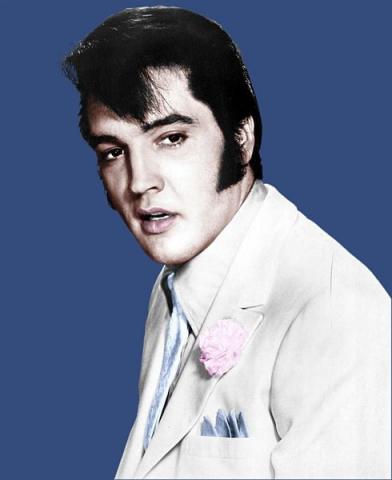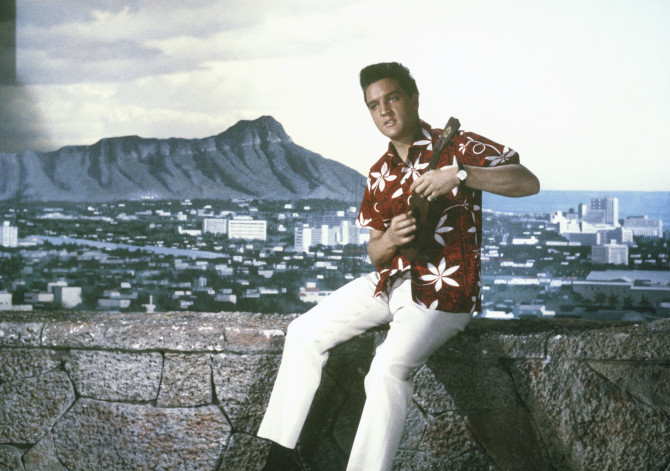Long Live the King: Elvis Presley and the Spirit of Tribute

Collingwood, Ontario is a small, resort-like town 90 miles north of Toronto that offers scenic beachfront access to the southern shores of Lake Huron’s Georgian Bay; there’s renowned skiing in the nearby Blue Mountains and close access to hiking along the famed 560-mile Bruce Trail. And for more than 20 years, Collingwood has also been home to the world’s largest annual Elvis Presley festival.
For one long weekend every July, the town’s population more than doubles in size as nearly 30,000 Elvis fans descend upon the main street of town for nonstop entertainment. More than 100 Elvis Tribute Artists (or ETAs – much preferred to the belittling term “impersonator”) come to perform at the event, singing songs on the main outdoor stage, in restaurants and cafes across town, and, perhaps most importantly, in the town arena, where rounds of competition take place every night in search of the festival’s best Elvis Tribute Artist.
Elvises (or Elvii) come in all shapes and sizes: tall, short, young, old, fat, thin, blond, brunette, male, female, American, Asian, European. Every last one of them seeks to pay reverent tribute to the King himself. You’ll be hard-pressed to find a drop of irony running these streets during the festival weekend, even at the vendor kiosks selling oversized gold aviator-style sunglasses with pre-attached sideburns. Overall, it seems, spectators and performers alike attend purely to indulge in the fun of the festival. But some ETAs take their fun more seriously than others.
When it comes to the competition, Elvis performers are judged in four primary categories: their vocal abilities (how much they can sound like Elvis), their style (how much they look like Elvis), stage presence (act like Elvis), and overall quality of performance (essentially, how well they can be Elvis, if only for the duration of a three-minute song). The competition is likewise divided between tributes to the “Early Years” of 1950s musical material and the “Concert Years” of white jumpsuit and Vegas fame. There’s also a split between non-professional ETAs and professional ones; the latter only qualify if they earn more than 50 percent of their annual income through their Elvis act alone.

While there’s a hefty chunk of change waiting for the grand prize winner, Collingwood is only a stepping-stone to the larger ring. The festival is one of dozens around the world that act as preliminary qualifiers for the Ultimate Elvis Tribute Artist Competition held in Graceland every year, home of Elvis himself. The winner there – the King of Kings, so to speak – earns a $20,000 prize and a contract with the “Legends in Concert” series to continue performing their act for audiences across the nation.
Rubbing elbows with Elvis after Elvis all weekend in a small town is a surreal experience. From far away, so many of them really do look like Presley on stage, a feat that, rather than condemning his talents to a repertoire of easily-imitated postures, exemplifies and reiterates the impressive grandeur of his stage presence. Up close, it’s startling to see how much makeup many of the ETAs wear, how their precisely coiffed hair is dyed an unnatural shade somehow blacker than black, how much sweat seeps through their rhinestoned jumpsuits (which, depending on their quality and detail, can ring up price tags in the multiple-thousands of dollars). There’s whispered rumors of plastic surgery or other crafty cheekbone enhancements; there’s alleged sightings of girdles beneath those form-fitting robes.
To an outsider, such efforts might seem over the top. But it’s clear that commitment is a part of the game, a trait that Elvis himself rightly embodied. And like the legend, his tribute artists are unfailingly gracious to their audiences, always willing to stop and pose for a photo, sign a festival program, maybe even toss you a flirtatious scarf or Hawaiian lei dabbed with perfumed sweat. The stereotype of deranged impersonators who think they’re Elvis reincarnate couldn’t be further from the truth: the ETAs are a tight-knit group of down-to-earth folk. They greet each other by name, encourage each other as they take to the stage, help each other out when a backing track malfunctions or a costume piece goes missing. The festivals, for them, are more like family reunions.
In fact for some, it truly is a family affair. This year’s competition winner, Norm Ackland, Jr., follows in the ETA footsteps of his father; his eight-year-old son, Jax, also performed at the festival. But apart from these generational legacies, the whole event is heavily catered toward an increasingly geriatric crowd. Presley would have been 81 years old come this January, and many of his living fans are not far behind. Though his spirit endures through festivals like Collingwood, one has to wonder what will happen to these tributes once the demographic itself gets a little too old to shake, rattle, or roll anymore.
“The issue isn’t that the younger demographic doesn’t like Elvis,” Rosemarie O’Brien, General Manager for the Collingwood Elvis Festival, told me. But the challenge of attracting newcomers still weighs on organizers’ minds. “I just don’t think [younger people] have ever been educated on what Elvis did for music history and how it impacts and influences what they get to listen to now.” The animated zeal of tribute festivals, however, has the potential to engage neophytes in a way that static museum displays or textbooks cannot. O’Brien says that Collingwood hopes to carve more space for education – as well as entertainment – in future festivals. “There’s so much to represent about what he did for history. Young people seem to radiate to that aspect, and then they start paying attention to what he did musically.”
In a modern world of Miley Cyruses and Robin Thickes, Elvis Presley might not be the bastion of irrepressible sexuality that he once was. Far from appearing controversial, he’s what most young people today associate with their grandparents’ quaint and conservative generation. But that doesn’t stop his tributers or his fans from celebrating the lively vitality that he brought to the stage, the dynamism for which contemporary rock and pop artists still owe a great debt. O’Brien laughs with confidence: “I’ve always said, ‘If I can get you here, I’ll keep you here.’ People get caught up in the spirit of the festival, the spectacle and the fun and the music.” As long as the tribute show goes on, so too will the tradition of Elvis.
Author Bio:
Sandra Canosa is Highbrow Magazine’s chief music critic.
For Highbrow Magazine
Photo credits: Tzalli (Wikimedia.org, Creative Commons); Blue Hawaii movie still (Fair Use)




























































































































































































































































































































